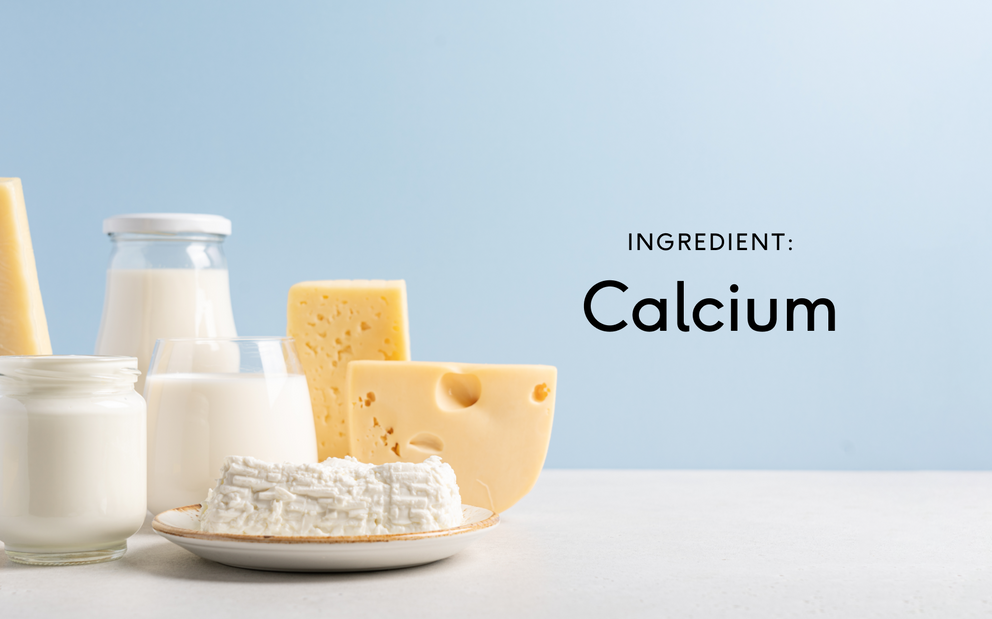Learn About Calcium in 5 Minutes
Table of contents

What is calcium?
Calcium is an essential mineral that’s necessary for bone and cardiovascular health. It's the most abundant nutrient in the body, it' stored and used when needed.
- Improves bone health and prevents osteoporosis
- Prevents cardiovascular disease and reduces cholesterol in the blood
- Helps reduce blood pressure and prevents hypertension
- Supports reproductive health by preventing pre-eclampsia
- Reduces weight gain to help prevent obesity
Why we love calcium
Calcium is an essential mineral, which means that your body can’t survive without it. Not only is calcium necessary for cell signalling, but it also has a variety of benefits that can help you avoid serious diseases.
For instance, calcium is one of the main constituents of your bones, and you need to maintain a steady intake of calcium to protect your bone density and prevent fractures. This essential mineral also plays a key role in the cardiovascular system, and it may even help you maintain a healthy weight. Since it can be hard to get the calcium you need with a modern diet, we included the exact amount of calcium you need in Feel to make sure you won’t become deficient in this vital nutrient.
Unbelievable benefits of calcium
Over the years, scientists have discovered quite a few different impressive benefits of calcium. Here are just a few examples:
Bone density benefits
According to scientific research, adequate calcium intake is absolutely essential to optimal bone health. One study took a look at the combined benefits of supplementing with calcium and vitamin D, and the researchers found that consuming adequate levels of calcium was especially effective if you’re deficient in this essential mineral. If you want to avoid developing osteoporosis and other conditions that reduce your bone density, you’ll need to supplement with calcium.
Cardiovascular benefits
Research shows that getting your recommended daily intake of calcium might reduce your risk of ischemic heart disease, which occurs when your blood vessels become too narrow. What’s more, it also appears that supplementing with calcium may reduce your risk of hypertension, which is a dangerous form of high blood pressure that can damage your cardiovascular system over time.
Reproductive benefits
Pre-eclampsia is an unfortunately common type of hypertension that happens to women during the later stages of pregnancy. If you’re pregnant and concerned about pre-eclampsia, rest assured that it seems supplementing with calcium may reduce your risk of developing this condition that could harm the health of your baby.
We've included 40mg of Calcium in Feel Pregnancy, essential for supporting the health of you and your baby.
Metabolic benefits
If unexpected weight gain is getting you down, you’ll be pleased to hear that supplementing with calcium appears to improve your metabolism and reduce your chances of becoming obese. Research indicates that women who supplement with calcium generally have lower body weights, which means that this essential mineral might be just the thing if you’re trying to shed a few excess pounds.
Other Benefits
In addition to the benefits we’ve covered so far, calcium appears to reduce your chances of getting kidney stones, and this essential mineral may even be beneficial to your overall neurological health. In general, your body needs calcium to perform a wide variety of different processes, but it’s all too easy to become deficient in this vital nutrient. Vegans and vegetarians are even more in need of calcium supplementation, and taking a daily capsule of Feel will provide you with all the calcium you need to stay healthy, productive, and happy.
Is calcium water-soluble or fat-soluble?
Since calcium cannot be broken down without a carrier, it is generally considered to be fat-soluble. It takes the body a while to absorb calcium, which is then stored in the body for for quite some time.
Where can calcium be found naturally?
Calcium is most abundant in dairy products like milk, cheese, and yoghurt. This mineral is available in certain vegetables to a lesser degree. Calcium present in vegetables is less bioavailable than calcium present in dairy products.
5 foods/drinks containing calcium
1. Yoghurt 42% DV per 227g
2. Mozzarella cheese 33% DV per 43g
3. Spinach 19% DV per 1 cup cooked
4. Skimmed milk 30% DV per 227g
5. Tofu 25% DV per ½ cup or 64g
What is the recommended daily intake for calcium?
The Office of Dietary Supplements (ODS) suggests that male and female adults over the age of 18 should consume 1000mg of calcium per day. This recommended daily amount (RDA) does not change during pregnancy or lactation, but over 50 should start consuming 1200mg of calcium per day to offset osteoporosis, and men should increase their daily dose of this mineral to 1200mg at the age of 70.
What to consume to get a full daily dose of calcium?
Yoghurt - around 510g
Mozzarella cheese - around 129g
Spinach - around 5 cups cooked
Cow's milk - around 709g
Tofu - around 2 cups or 256g
Can you absorb enough of calcium from food?
Even with the prevalence of calcium-fortified foods, it’s relatively difficult to get enough calcium in your diet. Ideally, you’d be able to get enough calcium from non-fortified dairy products alone, but vegans practice dairy-free diets. Instead of taking the chance of becoming calcium deficient, it’s best to get the exact daily dosage with a daily capsule of Feel.
Why is calcium necessary for your body?
Calcium is responsible for a variety of signalling and modulation processes in your body. For instance, calcium is necessary for both vasoconstriction and vasodilation, which are the narrowing and widening of your blood vessels. This nutrient also plays a critical role in hormonal secretion and muscle functioning, but the vast majority of the calcium in your body is used to make sure your bones maintain their proper density. Almost your entire skeletal structure is made of calcium, so any drop in calcium intake will harm your bone integrity.
Functions of calcium
Bone maintenance: While your bones might seem solid, they are constantly reshaping themselves, and especially during childhood, calcium deficiency can result in deformed bone growth. Calcium is also necessary to prevent osteoporosis and other brittle bone diseases.
Blood vessel constriction and dilation: Your cardiovascular system uses calcium as an agent to expand and contract the walls of your blood vessels.
Signalling processes: From neuronal signalling to hormonal sections and signals sent within cells, small amounts of calcium are used in almost every signalling process in your body.
Symptoms of calcium deficiency
Osteoporosis
Osteoporosis is the most common symptom of calcium deficiency in individuals over the age of 50. This condition causes your bones to become more brittle or “porous,” which makes it easier to sustain bone fractures. Osteoporosis also leads to an overall decrease in bone density that can put excessive strain on your muscular structure.
Cardiovascular disease
Due to its key role in vasoconstriction and vasodilation, deficiency in calcium can result in a wide variety of cardiovascular diseases. For instance, calcium deficiency can cause hypertension, and not getting enough of this mineral is the primary cause of pre-eclampsia, which is a type of hypertension that occurs in women in late stages of pregnancy. Calcium also appears to help your body process lipids better, which leads to less arterial clogging.
Irregular bone development
Children who do not consume enough calcium are more prone to develop bone deformities. In some cases, these deformities may be painful and irreversible, and they may significantly impact the quality of life of an affected child.
How long do you need to take calcium to start experiencing its benefits?
It can take several months for calcium supplementation to have a positive benefit on your health.
Consistency is key and our research recommends taking your Feel supplements for at least 3 months to allow your body to adjust and provide the desired benefits.
How long does it take for your body to digest/absorb calcium?
As a fat-soluble nutrient, it takes your body quite a while to fully absorb calcium. Certain types of calcium, such as calcium carbonate, are absorbed better when they are consumed with food. How long does calcium stay in your body after you take it? Since calcium is stored in your bones, the calcium you consume stays in your body for a period of months or even years. However, your body does gradually cycle through the calcium it has stored.
Is calcium an antioxidant?
On its own, calcium is not an antioxidant. Some forms of calcium however, such as calcium carbonate, are antioxidants, which means that they help restore the balance of free radicals and antioxidants in your body.
Can you overdose on calcium? What are the effects?
The technical term for calcium overdose is hypercalcemia, and this condition can cause cardiovascular problems, weakened bones, and promote the formation of kidney stones. To avoid the symptoms of hypercalcemia, stick to your RDA of this mineral present in Feel.
Does calcium dissolve, flush out, or build up in the body?
Calcium builds up in your bones. Depending on the bioavailability of the calcium supplement you ingest, you may flush out some of the calcium in your supplement.
Can you take calcium during a diet?
Consuming adequate levels of dietary calcium does not interfere with any dietary restrictions. In fact, making sure you get enough calcium every day may even reduce your chances of becoming obese. However, people who do not consume dairy may have trouble sourcing adequate levels of calcium from food.
Are there synthetic forms of calcium?
Scientists have created a variety of forms of synthetic calcium. However, there is no indication that these types of calcium have any advantages from a dietary perspective.
Why might synthetic forms of calcium be better?
Every type of synthetic calcium that has been made to date has not been produced for dietary supplementation purposes. Therefore, there is no advantage to consuming synthetic calcium.
Absorption rate of synthetic calcium
Theoretically, the synthetic forms of calcium developed to date would have vastly inferior absorption rates if they were consumed for dietary purposes.
Why might natural forms of calcium be better?
Sourcing your calcium from food and safe supplement forms is the best way to consume this essential mineral.
How to take calcium?
You can consume calcium in food, drinks, or in supplement form. Consuming calcium supplements may be superior if you want to make sure you ingest enough calcium every day to stay healthy.
Calcium trends in medicine
Recently, scientists debunked the mistaken impression that calcium supplementation may lead to an increased risk of macular degeneration. In this study, researchers pointed out that, in clinical settings, getting your RDA of calcium in supplement form did not increase the risk of macular degeneration. This research goes to show that we’re just starting to learn about all the benefits of calcium.
Why everyone should be taking WeAreFeel supplements
Without enough dietary calcium, your body won’t be able to maintain your bones, and the risk of osteoporosis and other diseases increases.
However, getting enough calcium in your diet is hard, which is why we've included 45mg of Calcium in Feel Multivitamin; exactly the right amount you need every day to stay strong, happy, and healthy.
Here’s the Proof
- Effectiveness and safety of vitamin D in relation to bone health.
- Relation of calcium, vitamin D, and dairy food intake to ischemic heart disease mortality among postmenopausal women.
- Dietary intake of dairy products, calcium, and vitamin D and the risk of hypertension in middle-aged and older women.
- Calcium supplementation for the prevention of pre-eclampsia.
- Calcium intake and body weight.




















































 Back
Back





